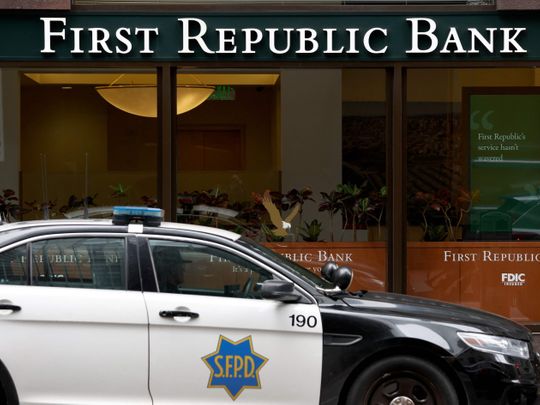
London: A day after the emergency rescue of Credit Suisse Group, another big selloff was unfolding at a US regional bank.
First Republic Bank plunged 36 per cent in US trading as people familiar with the matter said the lender is exploring strategic options including a sale. European banks failed to recover from yesterday’s losses, and Credit Suisse shares soared as much as 40 per cent on Thursday, before paring most of the advance.
It’s another indication that investors nerves about the banking industry are running high in recent days following the collapse of three US banks and a 50 billion Swiss franc ($54 billion) credit line coming from the Swiss central bank.
European Central Bank Vice President Luis de Guindos also highlighted concerns about banks, telling finance ministers Tuesday that some European Union lenders could be vulnerable to rising interest rates. He said lenders in the region are much less exposed than their US counterparts, according to people familiar with the talks, who declined to be identified discussing private conversations.
“Measures taken should provide some comfort that a spillover to the sector could be contained, but the situation remains uncertain,” Anke Reingen, an analyst at RBC Capital Markets, wrote in a note to clients Thursday.
Credit Suisse Group’s dollar-denominated bonds extended losses. The 1.305 per cent bond due 2027 plunged nearly 10 cents to 62.5 cents on the dollar, trading at spreads above 1,400 basis points “- a level associated with distress.
An index of banks in the Stoxx Europe 600 Index was little changed after gaining as much as 3.7 per cent.
In an interview with CNBC, Credit Suisse’s biggest shareholder said the lender isn’t likely to seek more capital and the bank is generally “sound.” In a memo to staff, the bank’s CEO Ulrich Koerner said the plan is to continue to focus on the transformation from a position of strength, citing an improved liquidity coverage ratio and recent capital raising.
Some analysts have doubts about whether the Credit Suisse can continue as a standalone company. Analysts at JPMorgan Chase & Co. said the crisis of confidence will likely result in it being bought by a rival. “Status quo is no longer an option,” wrote analysts led by Kian Abouhossein in a report that laid out three scenarios for the bank’s future.
“The initial fallout has been contained by the SNB’s backstop overnight, but I think the cat’s out of the bag in terms of the lagged damage that aggressive policy tightening can do to both the real economy and financial markets,” said Viraj Patel, a global macro strategist at Vanda Research in London. “There will remain a bit of nervousness in markets as investors wait to see what happens next.”







